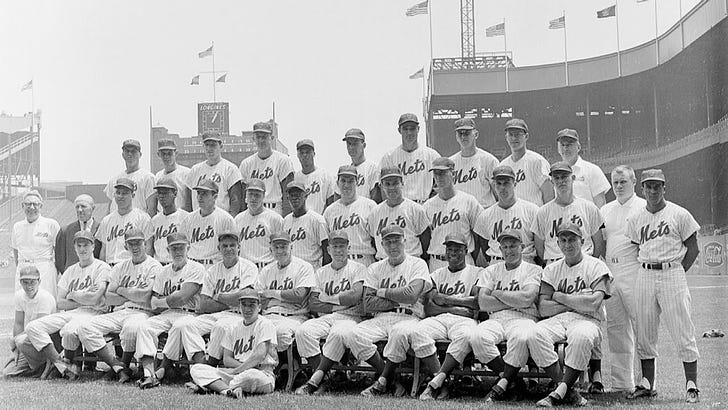The Amazin' Company The 2024 Chicago White Sox Might Keep
Major League Baseball has produced plenty of awful teams, but few ever become legendary.
The 2024 Chicago White Sox are bad to a degree I cannot fathom. I write the preceding sentence as someone whose baseball fandom was forged watching some inept Chicago Cubs teams on WGN, and having had my interest in the sport wane for years as a direct result of the 101-loss 2012 season.
And for as awful as the 2012 Cubs were, their 101 losses — the most a franchise long synonymous with losing accrued in almost a half-century! — were significantly fewer than the 109 that the 2024 White Sox have as of this writing.
The club’s guaranteed the worst record in franchise history. That’s no small feat, given White Sox history dates back 123 years. This team is careening toward surpassing the 1962 New York Mets as the worst club of the post-expansion era.
Let’s set the context for just how remarkable what we see unfolding in Chicago is this season with a quick look at some of the company the 2024 White Sox are on pace to join.
1962 New York Mets (40-120-1, 0.248)
Before football’s AFL, basketball’s ABA and hockey’s WHA ushered their sports into a modern age, another upstart league did the same for baseball without ever playing a game. The Continental League was announced in 1959 and took the bold approach of attempting to woo MLB teams into jumping over.
Of course, that didn’t happen — but the Continental League’s presence prompted MLB ownership to embrace aggressive expansion. Roy Terrell’s December 1960 Sports Illustrated feature on the meetings that led to expansion offer an illuminating examination of “the damnedest mess baseball has ever seen.”
Mess became a word synonymous with early ‘60s expansion and franchise movement because of one club in particular. A cornerstone of MLB redrawing its map was filling New York’s National League void left with departure of the Dodgers and Giants to California.
The Mets debuted in 1962 and made immediate history as one of the worst teams ever in baseball. A nine-game losing streak right out of the gate set an ominous tone, tying the then-record for worst start in modern history.
Following his team’s ninth consecutive loss, Mets manager Casey Stengel told reporters, “I don’t know what I’m going to do.”
Stengel’s quips provided highlights in a mess of a season otherwise loaded with lowlights. New York lost 109 games or more each of Stengel’s three full campaigns, during which he coined the nickname Amazin’ Mets.
1935 Boston Braves (38-115, 0.248)
It’s fascinating that the go-to example for a legendary baseball player overstaying beyond his expiration date while with an organization other than where he made his name is Willie Mays with the Mets — a team he helped reach the World Series — and not Babe Ruth with the Braves.
Sure, there’s a nod to the Babe’s futility upon his return to Boston in the 1992 biopic starring John Goodman. However, the film’s climax celebrates Ruth’s three home runs against the Pittsburgh Pirates, culminating in an anachronistic finale wherein the Babe triumphantly tells off ownership before walking away from the game.
That’s not quite how it went. It was the last appearance of Ruth’s illustrious career, yes, but the Babe spent nearly a month in limbo while insisting that newspaper reports of him being on his way out were false.
A more fitting cap for Ruth’s legacy than the horrendous month-and-change he spent as a Brave was his tour of Japan the previous offseason. Babe’s barnstorming with a team of American stars is a seminal moment in the growth of the game across the Pacific. It’s also a bit eerie revisiting headlines like the below declaring “Conquest of Japan is Easy,” considering the thousands of American and Japanese deaths to come in World War II.
Oh, as for Babe’s last MLB game, his hitting three home runs provided a worthy punctuation mark during a dismal campaign. However, the Braves lost that game, 11-7.
1899 Cleveland Spiders (30-124, .1299)
Never say never, but…the 1899 Cleveland Spiders’ futility will never be matched. One reason is that, no matter how much some of the more egregious, penny-pinching owners field dubious rosters, nothing can ever match the chicanery that fostered the makeup of the Spiders.
Spiders owner Frank Robison bought the St. Louis Browns shortly before start of the 1899 season and proceeded to move all of Cleveland’s best players to St. Louis. Cy Young was among the cadre of Spiders sent to the renamed Perfectos.
Another Spider shipped to St. Louis, Bobby Wallace, hit 12 home runs in 1899 — matching Cleveland’s entire lineup’s production for the season. No Spider hit more than two.
If nothing else, the plight of the 1899 Spiders is a fitting reflection of 19th robber-barons creating nefarious monopolies before Theodore Roosevelt ushered in the Progressive Era. And, if ownership actively sabotaging Cleveland’s chances didn’t doom it enough, a scheduling snafu resulted in the Spiders playing 112 games on the road.




